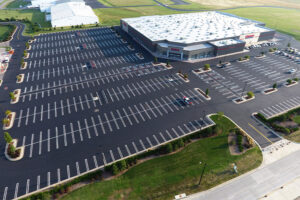When it comes to your commercial concrete projects, the pre-planning phase lays the foundation for a smooth and efficient paving process. From large-scale office complexes to industrial facilities, pre-planning is crucial in ensuring that commercial concrete projects are completed on time, within budget, and to the highest quality standards. Our experts at Encore Pavement, a leading concrete company in Wichita, Kansas, provide customers with milling and paving, sealcoating, asphalt repairs, concrete construction, and other property maintenance services and are exploring how proper pre-planning contributes to the success of commercial concrete projects. Learn more below!
Selecting the Right Material
In the realm of commercial concrete projects, material selection is a critical decision that directly impacts the project’s longevity and cost-effectiveness. Pre-planning allows you an opportunity to thoroughly evaluate various materials based on strength, durability, environmental impact, and cost. This proactive approach gives you the chance to make informed decisions that balance performance with budget considerations. Moreover, pre-planning facilitates exploration; staying open to new possibilities can lead to more sustainable, efficient, and aesthetically pleasing outcomes!
Maintaining an Efficient Schedule
It’s been said that time is money, especially when it comes to commercial concrete applications. Project delays can have cascading effects on budgets and client satisfaction. With effective pre-planning, your concrete company can create a detailed project schedule that outlines every phase of the construction process. This schedule considers the availability of resources, weather conditions, and potential bottlenecks, allowing for a realistic timeline. By identifying potential challenges in advance, pre-planning enables the implementation of strategies to mitigate delays. It also provides you the flexibility to adapt to unforeseen circumstances without compromising the overall project timeline.
Mitigating Potential Risks
Every commercial concrete project carries inherent risks, ranging from design flaws to unforeseen site conditions. Pre-planning includes a comprehensive risk assessment that identifies potential pitfalls and outlines strategies to address them. This not only minimizes the likelihood of disruptions during the construction process and helps maintain project momentum but also allows for contingency plans. Should a risk materialize, having a predefined plan of action can significantly reduce downtime and keep the project on track.
Adhering to a Designated Budget
Cost overruns are a common challenge in construction, but a well-defined pre-planning process can play a monumental role in preventing them. Your plan should include an accurate cost estimation, considering factors such as labor, materials, equipment, and unforeseen expenses. This detailed budgeting provides a clear financial roadmap, enabling business owners to make informed decisions for their businesses. Pre-planning also allows for value engineering, where cost-saving measures can be identified without compromising the project’s integrity. By strategically analyzing design and construction alternatives, you can optimize expenses while achieving the desired outcomes.



